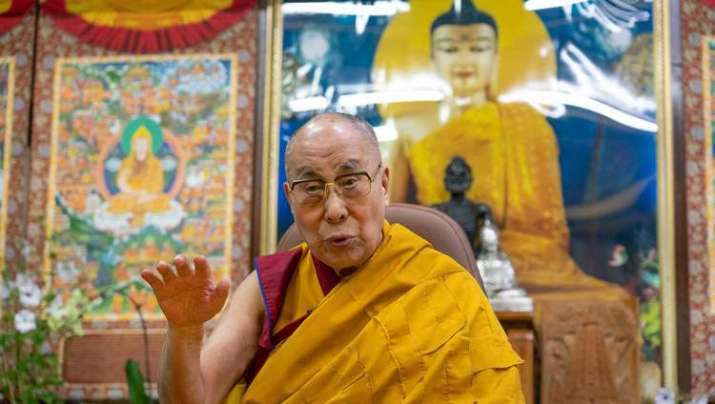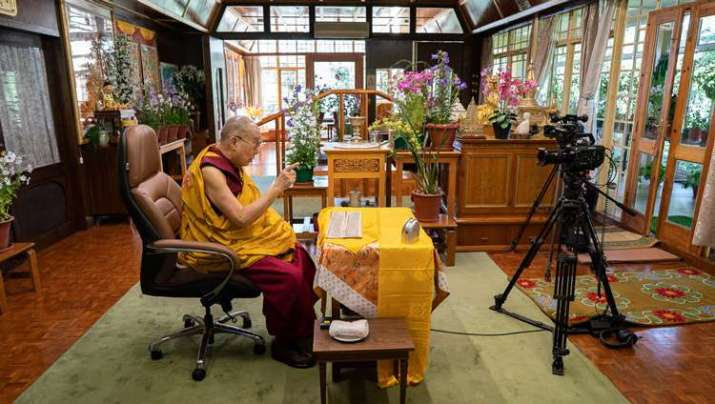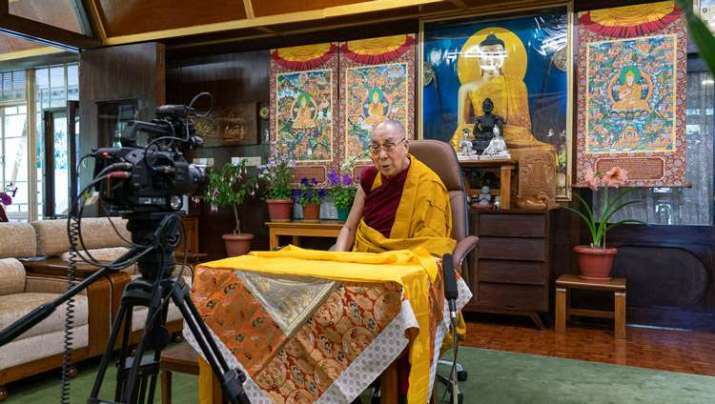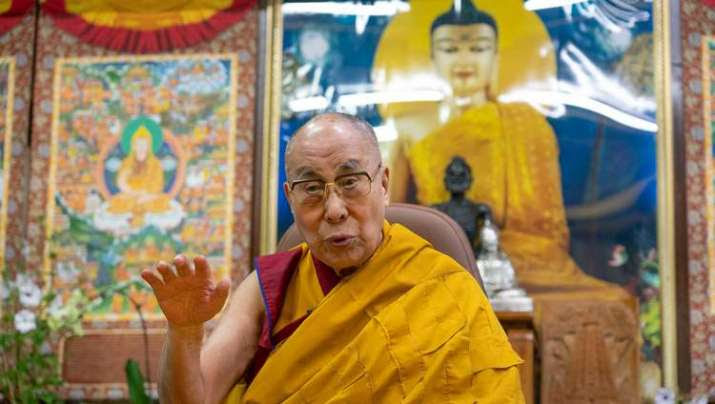 His Holiness the Dalai Lama speaks on the second day of his teaching on Nagarjuna’s Precious Garland on Sunday. Photo by Ven Tenzin Jamphel. From tibet.net
His Holiness the Dalai Lama speaks on the second day of his teaching on Nagarjuna’s Precious Garland on Sunday. Photo by Ven Tenzin Jamphel. From tibet.netHis Holiness the Dalai Lama gave a two-day virtual public teaching on Saturday and Sunday from his official residence in Dharamsala, northern India, drawing from the Precious Garland text by the Buddhist scholar Nagarjuna (c.150–c.250 CE).
Indian Buddhist philosopher who articulated the doctrine of emptiness (shunyata) and is traditionally regarded as the founder of the Madhyamika (“Middle Way”) school, an important tradition of Mahayana Buddhist philosoph
In his first-ever teaching without a physical audience in front of him, the Tibetan spiritual leader’s two-day exposition on chapters one and four of the Precious Garland was shared live with the world, along with more general advice for people coping with difficult living conditions during these challenging times. The global teaching was given in Tibetan, with translations available in Chinese, English, French, German, Hindi, Italian, Japanese, Korean, Mongolian, Portuguese, Russian, Spanish, and Vietnamese.
“Today, we are able to use this marvelous technology to communicate. Many friends have shown interest and requested a teaching, but due to restrictions related to the coronavirus pandemic, we are not able to meet physically,” His Holiness began. “The main topic of my talk today will be Nagarjuna’s Precious Garland, which, along with the six books of the Collection of Reasoning, we continue to study. The first part of the text, which I’ll read today, deals with the 16 factors for high status or good rebirth. Later in the text is the verse:
May sentient beings be as dear to me as my own life,
And may they be dearer to me than myself.
May their ill deeds bear fruit for me,
And all my virtues bear fruit for them.” (His Holiness the 14th Dalai Lama of Tibet)
The octogenarian Nobel Peace Price laureate observed that the growing levels comfort and ease of material progress and development had only encouraged ignorance toward inner peace, such that even the most materially successful people are prone to discontent and unhappiness. The antidote, he stated, is understanding that mental and emotional well-being are key to inner confidence and happiness.
 The Dalai Lama speaks live to a global audience from his residence in Dharamsala. Photo by Ven. Tenzin Jamphel. From tibet.net
The Dalai Lama speaks live to a global audience from his residence in Dharamsala. Photo by Ven. Tenzin Jamphel. From tibet.net“Many of our problems are rooted in the unruly state of our minds. We are attached to our friends and relatives and hostile to foes. We neglect the fact of our interdependence. As Shantideva makes clear: All those who suffer in the world do so because of their desire for their own happiness. all those happy in the world are so because of their desire for the happiness of others. For those who fail to exchange their own happiness for the suffering of others, Buddhahood is certainly impossible—how could there even be happiness in cyclic existence? Nagarjuna points out that action and negative emotions arise from mental fabrication:
Through the elimination of karma and affliction there is nirvana.
Karma and affliction come from conceptual thought.
These come from mental fabrication.
Fabrication ceases through (realizing) emptiness.
“Since we are the same in wishing to find happiness and overcome suffering, we need to pay more attention to cultivating peace of mind and tackling our disturbing emotions.” (His Holiness the 14th Dalai Lama of Tibet)
His Holiness also addressed his three personal commitments: to encourage people to be happy and to help them understand the importance of incorporating human values into their lives and securing peace of mind; to promote harmony among the world’s religious traditions; and to preserve Tibetan language and culture, and speak up for the protection of Tibet’s natural environment.
“Today, the state of the world is quite critical. Medical professionals are on the frontline treating patients suffering from COVID-19. I sincerely rejoice in the courage of them all and lament that some have sacrificed their lives in the care of others,” the Dalai Lama observed during his concluding remarks on the second day of his teaching. “We should not let ourselves become despondent or demoralized because it doesn’t help. When problems like this pandemic come about, if we human beings don’t work together to solve them, who else is going to do it?” (His Holiness the 14th Dalai Lama of Tibet)
 His Holiness gives his first public teaching in four months and his first without an audience present. Photo by Ven Tenzin Jamphel. From dalailama.com
His Holiness gives his first public teaching in four months and his first without an audience present. Photo by Ven Tenzin Jamphel. From dalailama.comOn 31 January, a representative of the office of the Dalai Lama announced a suspension of all public audiences with His Holiness as a precaution in light of the rapidly spreading novel coronavirus. The news came a day after India reported its first confirmed case of the virus, in the southern state of Kerala.*
Novel coronavirus (nCoV) is a provisional name given to coronaviruses of medical significance before a permanent name is decided upon. Although coronaviruses are endemic












